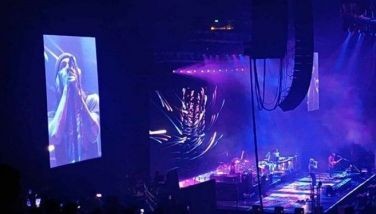New digital life for old stories
It must surprise a good many to be able to watch material from the 19th century transposed to present-day understanding. The introduction of digitalization is not without its shock value, however, as we muse on two shows we recently viewed — the Metropolitan Opera’s Rigoletto on high-definition video, and the National Geographic Channel’s film adaptation of Killing Lincoln.
We must admit to extreme disorientation, sitting at the Cultural Center of the Philippines’ (CCP) Little Theater watching the Italian master Giuseppi Verdi’s 16th-century masterpiece with the palace of the Duke of Mantua transposed to a 1960 Las Vegas casino with English subtitles no less. Perhaps, it was because we had experienced sitting at a theater in Vienna, watching the original version in Italian from a Balcony seat, binoculars in hand, yet understanding every scene. Perhaps, it is because we are an old soul, and we believe this is how grand opera should be staged. Or perhaps, it is because we think that some traditions should be respected, just like some historical buildings should stay as they are.
Of course, we understand this attempt to reach the “now†audience and also the state of the Metropolitan Theater’s (MET) finances. But even a cursory look through comments from respected reviewers yields discomfort in various aspects.
From Katy Austin last Feb. 18 when the new Rigoletto had just opened: “Verdi’s Rigoletto is a tragic, sexist and uncomfortable story which belongs firmly in the 16th century. But director Michael Mayer has managed a believable update to 1960s Vegas. The production apparently takes as its influence the ‘Rat Pack’. I find the allusion distracting. A word about those subtitles, too: They are significantly changed to reflect their ’60s setting. All this made for stunning cinema, although my usual gripe still stands about the cringe worthy funding pleas, illusion-spoiling backstage cameras and contrived hosting that come with the Met in HD showings.â€
Dr. John says, “Ms. Austin is not alone in abominating the intrusive, glutinous interviews that so demean the opera, the artists and the interviewers… Every opera needs a new production from time to time: It keeps the art-form alive. I agree this Rigoletto was possibly one that succeeded rather more often than it failed.â€
Fact & fiction in Killing Lincoln
If we were disappointed in many aspects of Rigoletto, we were most taken in by the docu-drama Killing Lincoln based on the bestseller of Bill O’Reilly and Martin Dugard, including accusations of fictionalized parts. Billy Campbell’s President Lincoln is quiet and forthright exactly as a documentary should be. In contrast, Jesse Johnson’s portrayal of killer John Wilkes Booth is, however, ostentatious and calling out for attention. The editing of simultaneous happenings on different locations was superb, which is what drew us to watch the more than two-hour run.
Booth in action and in speech would shout out such words as “I don’t want to shed blood. I stand with Brutus†in reference to Marcus Brutus who betrayed his friend Julius Caesar, participating in his assassination as in the Shakespearean play Julius Caesar.
In the narration of Tom Hanks, he informs the audience that history has reduced Booth “‘to a two-dimensional scoundrel,’ and dismissed as a madman. We should take into consideration that Booth was an actor who could be taking his roles more to heart. The docu-drama is National Geographic’s first original scripted drama that sought to give fair treatment to both Lincoln and Booth. Booth hated Lincoln with a passion declaring, ‘My Love is for the South alone.’ He went through much trouble attempting to kidnap Lincoln, stalking all his whereabouts, including the change of theater venue President Lincoln would watch with his wife and be shot. In the end, he succeeded and harnessed the largest manhunt launched by the US government. Still it took several days before Booth was discovered and died from wounds.
“On his part, President Lincoln shares having had the same dreams of death during this period. There are many untruths so that while O’Reilly calls it non-fiction, Killing Lincoln is considered a novel by many. Interestingly, as many as 1,500 witnesses to the assassination had been recorded, and none of them were the same!â€
(E-mail your comments at [email protected].)
- Latest
- Trending



























